|
2/11/2016 0 Comments our websiteWe are now a fully operational, independent charity under the Trussell Trust.
Visit our website here: Manchester Central Foodbank
0 Comments
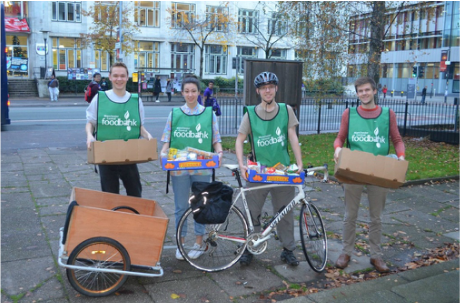 As the foodbank has grown and become more active the role of manager has moved from being a day-to-day job to one that requires more long term thinking. This has led to viewing the foodbank almost as a business in order to ensure that it is and will run. This includes looking at how many clients we will serve and how much food we will need. Focusing on all this administration can cause anyone managing the foodbank to lose sight of why they are really in the job, which is to feed those who come through our doors. The clients who through our doors are incredibly varied and represent the very wide range of crises that can cause food poverty. The reason anyone decides to volunteer or work at a foodbank is to help these people through their short-term crisis, as well as to help them out of it. This can be challenging when faced with clients who are difficult with volunteers when receiving food. Part of the ethos of the foodbank is to not judge anyone who comes for help. All people referred to us are in need and we as volunteers do not know the full extent of their history. It is dangerous to judge people based on your first conversation with them. Clients must be made as comfortable as possible in the foodbank and volunteers and employees must strive to ensure that even if they find it difficult or uncomfortable.  A difficult part of running a foodbank and managing volunteers is to not be bound by rules or structures. As a foodbank in the Trussell Trust network we are obliged to provide a minimum level of quality service to our clients. We are also instructed to follow volunteer and stock processes provided to us in the operating manual and by Trussell staff. However in practice it is not always possible to do everything by the book. This is particularly true when encountering clients who come through our doors. It is important to not pre-judge anyone who comes to our foodbank and everyone should be given the benefit of the doubt. So if there is something wrong with the voucher they provided or they are collecting on behalf of someone else it is important to not turn them away on technicalities. A rule is that if someone comes through the door with a food voucher they are provided with a food parcel. Issues with the voucher or the person should then be dealt through the referral agency they receieved the voucher from. We at the foodbank are volunteers and not trained frontline care professionals. We are therefore not in any position to assess or make judgements of clients. This is why the voucher system is so important. But as with all systems it will not always work perfectly every time.  When the idea of starting a foodbank in the Chaplaincy was thought of by the Chaplaincy SVP, it was only an idea. Many of the members of both the Chaplaincy and the SVP did not have much clue about how a foodbank operates in practice. A member of the SVP then found out about the Trussell Trust and the foodbank network they operated. The Trussell Trust runs a franchise model for helping to create foodbank around the country. They ask for a sign-up fee, followed by an annual payment, in order to a part of their network. On first impressions this did not strike us as something a new charity should have to do. However after several meetings with other Trussell Trust foodbank, we were convinced that it would be worth it. The major thing you receive after paying the sign-up fee is a 'Foodbank Operating Manual'. This manual provided on a cd, explains every procedure and step to setting up a foodbank. It is so comprehensive that you do not even need previous experience in the charity sector to set up a foodbank. The manual provides information from how to run supermarket food drives to warehouse management to the distribution of food. It even helps with budgeting and health and safety regulations. Without all this information the foodbank most likely would not have been established as quickly as it was. The Operating Manual is changed and refined every year or two. This is because the Trussell Trust is constantly learning new things as well as adapting to the changing situation of food poverty. The first Trussell foodbank was started in 2002 and the manual documents everything that has been learned since then by all new Trussell foodbanks. A great advantage of this manual also is that it will keep improving as even more foodbanks join in the network. It also guarantees that no matter which Trussell Trust foodbank you go to in the UK, you will always be provided with the same level of service, from people who all are motivated by the christian ethos of the charity. This is a resource that ensures that when a foodbank opens they are completely prepared for any situation they may come across and that mistakes are not repeated around the country. The Manchester Central Foodbank would not be where it was today without this amazing resource provided by the Trussell Trust, along with the continuing support of the charity staff and the national partnerships they help to build. The Trussell Trust does more than provide foodbanks with resources but also is able to unite everyone in knowing they are part of a national effort.  In the last few weeks we have welcomed our newest member of the foodbank team, Liam Hannan. Liam is our new Business Development Manager and is leading the the development of the foodbank's corporate structure and our registration with the Charities' Commission. As the need for foodbanks become more widespread it is necessary for foodbanks to become more professional and organised in their operations. This is not to say that we begin to lose sight of our values but rather to promote these values more efficiently and effectively. This way we can help more people and provide the same level of service to all those who walk through our doors. Liam at the moment is working along with a number of volunteer groups to establish a Charity Constitution for the Manchester Central Foodbank. We are also looking for those interested in becoming Trustees for the foodbank who will oversee the running of the project as well as looking at future objectives. If anyone is interested in getting further involved in the overall running of the foodbank they should contact us at [email protected] 3/2/2014 0 Comments Kettle Packs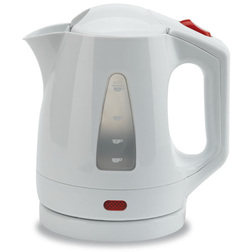 In recent weeks the Manchester Central Foodbank has started to give out modified food parcels to clients coming through our doors. These new packs are called "kettle packs" and all the food in them can be cooked with the use of a hob or cooker. An example of this would be replacing pasta with instant noodles. The clients who we have had to adjust our food parcels are all women who live in shared supported accommodation. These accommodation buildings are for vulnerable women with a large number being ex-convicts. They are very poorly furnished and tend to have only one kitchen set for up to twenty people. Because of this we were asked to modify packs to help everyone cook with their limited facilities. Coincidentally, this trend at our foodbank has begun as both the Trussell Trust and the Guardian have highlighted it in the national media. They have shown that kettle packs are being requested for different reasons by low income families. Up until now, the increasingly high energy costs have left many having to choose between heating and eating. Now, however, some families are not even able to turn on the cooker to heat contents of the food parcel. This trend has not been seen by our volunteers, but it is important we begin preparing for the possibility of more clients falling into this terrible situation. 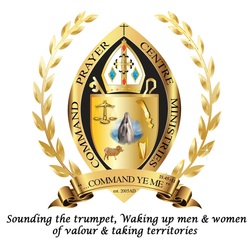 The Manchester Central Foodbank is happy to announce the a new partner Church that will help us in our work to relieve food poverty in Manchester. Command Prayer Centre, led by their Pastor Charles Kwaku-Odoi, will now be working with the Manchester Universities' Catholic Chaplaincy (MUSCC) in supporting our foodbank project. Charles brings a lot experience in both fundraising and working with community projects in Manchester. Our new partner Church will be a satellite distribution centre for Manchester Central Foodbank. At the moment clients come to MUSCC during our opening hours, Wednesday and Friday mornings (10am-12pm), with food vouchers to collect a food parcel. A satellite centre will be able to cover the days that MUSCC is unable to do at the moment. They will still accept the same vouchers and provide the same level of service. The plan is that Command Prayer Centre will be open Monday afternoons (12pm-2pm), eventually being open both Monday and Tuesday. This will grant greater flexibility to those referred to the foodbank both in when we are open and the different locations from which we will operate. Eventually MUSCC will also open on Thursdays, meaning that clients can use our foodbank service throughout the week. The date for our new satellite distribution centre opening is still to be determined but will occur within the next few months. This co-operation between MUSCC and Command Prayer Centre will allow the Manchester Central Foodbank to help more people who are in crisis across central Manchester. http://www.commandprayercentre.org/ 15/11/2013 0 Comments The power of 'Traditional' Media Much is made of how media and the way news is consumed is changing beyond all recognition. Newspaper sales are declining rapidly, and the number of people watching TV shows on an actual televisions is also falling. From this many people and commentators talk about the rise of digital media and how we should cast aside all these old or traditional media in favour of the new ones. In addition, it seems a binary attitude develops from this debate, where you prefer one over the other, defining yourself in the process. I do not see traditional media disappearing but merely becoming part of the much larger number of ways in which news and information can be consumed. All these ways have their own advantages and disadvantages. My experience of setting up the foodbank has helped me to realise that traditional media such as Newspapers, Television and Radio, still has a major role to play in raising awareness. It is through traditional media we have gained most recognition and received most contact. Everyone I have spoken to always tells me how they read about the foodbank in the paper or heard it on the radio. The number of people who tell me they heard of us 'first' on twitter or facebook can be counted on one hand. Traditional media has a reputation of professionalism which means stories and information have more impact on their audiences. Social Media still to many people is seen as a talking shop. The first thing everyone does (or should do) when they see a story on Twitter is to check its authenticity on a 'proper' news website. When the Manchester Central Foodbank is mentioned in the newspaper or on the radio, people seem to register the information in a different way. For the foodbank to raise awareness and to get more individuals and organisations helping us, we have to continue using this type of media. Social Media can only really compliment (at least for the time being) our drive to get more people in the community aware of the work we are doing. 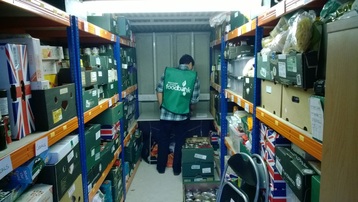 Me in the foodbank Warehouse, looking like I'm working Me in the foodbank Warehouse, looking like I'm working What a hectic 8 weeks! It has been in the back of mind that I hadn't written a new blog in almost 2 Months. And this is do the very busy start the foodbank has had in the new academic year. In this time we had a major recruiting drive for new volunteers in fresher's weeks for both the University of Manchester and Manchester Metropolitan. This was followed by a training session for all our new volunteers the week after as well as a lot of work to get the foodbank ready to open. In addition the fact that we are the first student-run foodbank in the UK has attracted a lot of attention in the local media, which proved very helpful in raising awareness of the foodbank and how we can help people. This was all before we were able to officially open our doors to clients! We have just finished our fifth week of officially being open and this week was also the first week in which we were open for two days. A very large number of agencies and charities who work with those close to food poverty have been constantly getting in touch with us requesting to become referral partners. This has shown that in Manchester there is a very real demand for the service we provide. Since we have opened we have helped give food to 50 people (23 Children and 27 Adults), who have all been referred to us by frontline professionals. Helping this many people means we have distributed 261.9kg of food! All volunteers agree they were surprised at the range of people who have walked through our doors as well as the wide variety of crises we have heard that can cause food poverty. Sadly we foresee the demand to only increase in the months ahead and we are always looking for new volunteers to sign up and help out. (Contact us at [email protected] if you are interested!) Since opening our doors the work at the foodbank has begun to settle into a more predictable rhythm. Volunteers are now getting a better idea of what they can do and how they can best go about helping those in crisis, but this does not mean we should rest on our laurels. A foodbank is a project uniquely suited to the needs of the local community. This is because of the proximity of the bank itself as well as the flexibility we have with a dedicated team of volunteers who all truly want to help others. We must therefore be on always looking out for new opportunities to better serve those in crisis and the community as a whole. The foodbank is a collaborative effort and the input of every volunteer is equally important to ensuring the foodbank continues to operate successfully. Anyway, I hope to begin writing these blogs more frequently again so please keep checking if you want to keep up-to-date on what's going on at the foodbank! 11/9/2013 0 Comments Fresher's Week - Join the Team!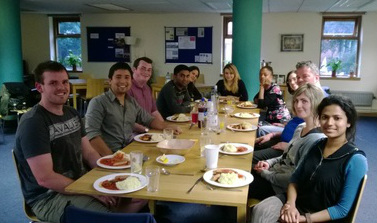 Some of the foodbank team Some of the foodbank team A big welcome back to all students, old and new, returning to the busy world of University life! Fresher's week, or Welcome week, is a big time in the year as a whole host of groups and societies vie for the attention of students, especially Freshers. We hope that what we are doing can gain some student's attention. Manchester Central Foodbank is based in the Manchester Universities' Catholic Chaplaincy (MUSCC), next to the Church of the Holy Name. The Chaplaincy serves all three universities on Oxford Road and is open to all students new and old. The foodbank is part of the Trussull Trust foodbank network and will be the first Student-run foodbank in the UK. We provide emergency food relief for local people in crisis who are referred to us by frontline care professionals. We need enthusiastic students who are willing to give up a few hours of their week in order to volunteer for the foodbank. We plan to open our doors to clients October 2nd and our volunteers will need to be trained by the Trussell Trust prior to this date. There is a wide variety of volunteering oppurtunities, including greeting clients, food sorting, fundraising and publicity. If you are at all interested come along to the Chaplaincy at any time during Fresher's week to find out more. Or e-mail us at [email protected]. |

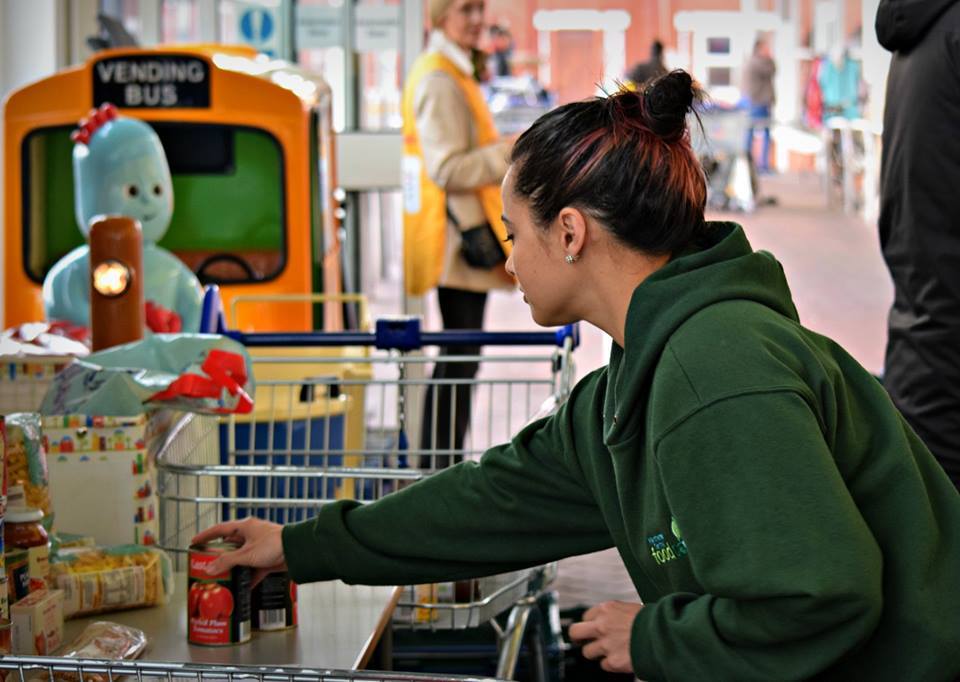
 RSS Feed
RSS Feed
